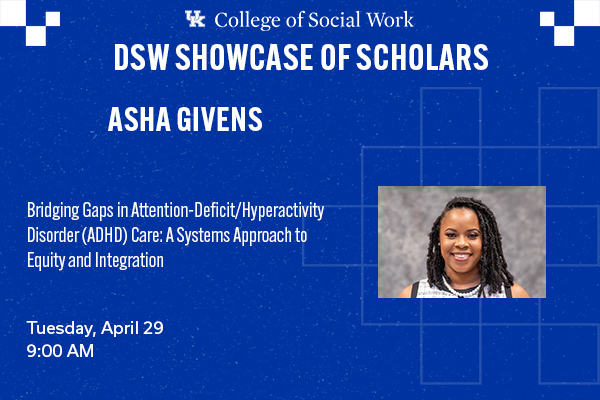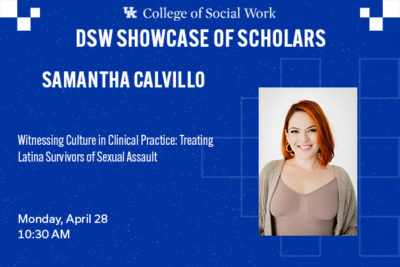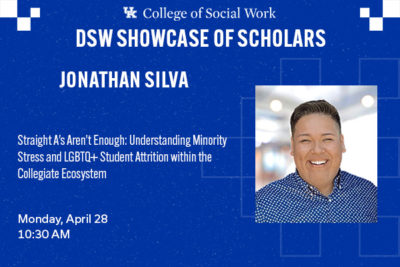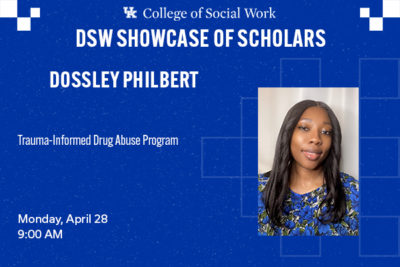DSW Candidate – Asha Givens, 9:00 AM – 10:15 AM
$0.00
Virtual Showcase of DSW Scholars 2025 Event!
Bridging Gaps in Attention-Deficit/Hyperactivity Disorder (ADHD) Care: A Systems Approach to Equity and Integration
DSW Candidate – Asha Givens, LMSW, ADC, Certified Holistic Doula
Tuesday, April 29, 2025
9:00 AM- 10:15 AM Eastern Time Zone
Credit Hours: 1.0 (ACE)
Description
Bridging Gaps in Attention-Deficit/Hyperactivity Disorder (ADHD) Care: A Systems Approach to Equity and Integration
Attention-deficit/hyperactivity disorder (ADHD) is a prevalent neurodevelopmental disorder characterized by persistent difficulties with inattention, hyperactivity, and impulsivity, which substantially affect daily functioning and developmental trajectories. According to the U.S. Centers for Disease Control and Prevention (CDC) (2024), approximately 7 million children aged 3–17 years (11.4%) in the U.S. have been diagnosed with attention-deficit/hyperactivity disorder (ADHD), yet its diagnosis and management remain inconsistent due to systemic barriers, healthcare disparities, and limited interdisciplinary collaboration.
For instance, a 16-year-old pregnant adolescent with ADHD experienced significant disruptions in care when transitioning from pediatric to adult services, due to resistance from providers buy-in, Medicaid restrictions, prolonged psychiatric wait times, and co-occurring perinatal depression. This case underscores the critical need for an integrated care model designed to address the complex and multifaceted needs of individuals navigating both developmental and systemic barriers to effective treatment.
Grounded in Ecological Systems Theory and Systems Theory, this presentation examines the integrated model used by Federally Qualified Health Centers (FQHCs) to demonstrate how enhanced coordination between primary care and behavioral health providers can improve ADHD diagnosis and treatment, advocating for its adoption across all healthcare settings. It will also address key barriers to integrated care, such as provider training, financial constraints, and workflow challenges. Also, it will present strategies for advancing equitable, culturally responsive ADHD care across diverse healthcare settings.
Learning Objectives:
Upon completion of this conference, participants will be able to:
- Learn how Ecological Systems Theory and Systems Theory guide the integrated care model in Federally Qualified Health Centers (FQHCs) to improve ADHD diagnosis and management.
- Assess how better coordination between primary care and behavioral health providers improves ADHD diagnosis and treatment, and discuss how this model can be applied in various healthcare settings.
- Identify key barriers to implementing integrated care for ADHD, while ensuring ADHD care is fair and culturally sensitive for diverse patients in various healthcare settings.
Delivery Method: Live Interactive Training via Zoom Video Conferencing
Credit Hours: 1.0 (ACE)
Target Audience: This conference is intended for social workers and students.
Accreditation: University of Kentucky College of Social Work, Provider # 1377, is approved as an ACE provider to offer social work continuing education by the Association of Social Work Boards (ASWB) Approved Continuing Education (ACE) program. Regulatory boards are the final authority on courses accepted for continuing education credit. ACE provider approval period: 9/29/22-9/29/25. Social workers participating in this conference will receive up to 15 general continuing education credits.
Claiming CE Credit: Instructions for claiming CE credit will be disseminated at the beginning of each session.
Questions: If you have any questions regarding CE credit or to report a grievance, please contact Christina Krantz at Christina.Krantz@uky.edu. For technical assistance, please contact lmshelp@uky.edu.
Disclaimer: The views and opinions expressed in these presentations are those of the individual presenters and do not necessarily reflect the official policies or positions of the University of Kentucky or the College of Social Work. The inclusion of any topics, perspectives, or discussions is intended for academic engagement and does not constitute endorsement by the institution.



